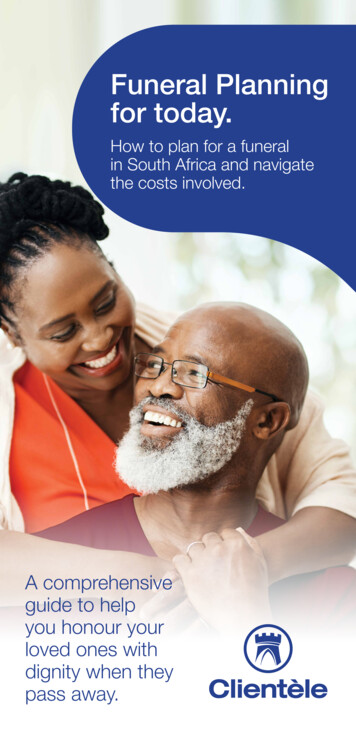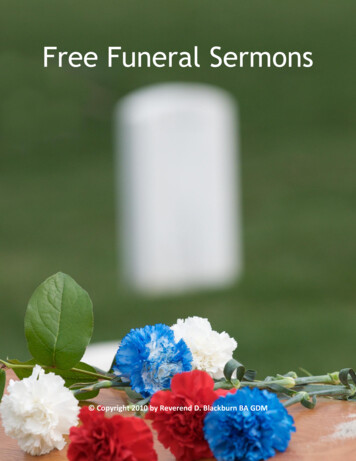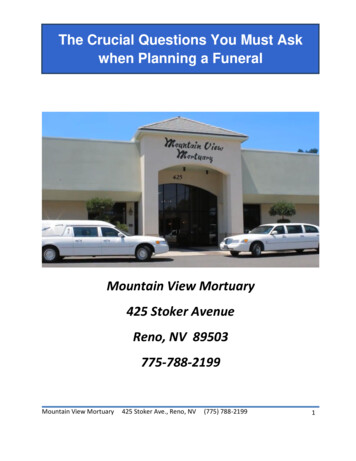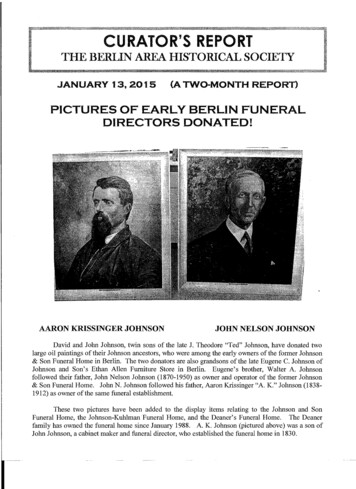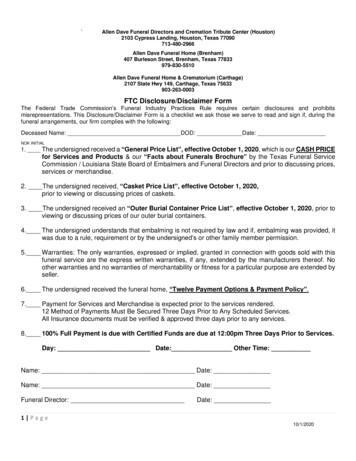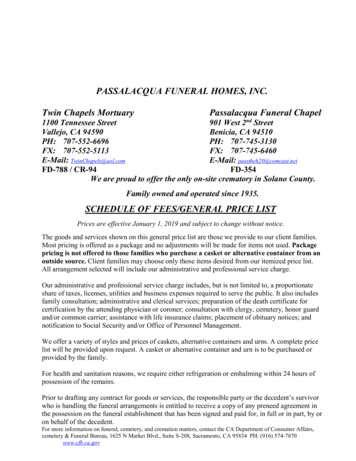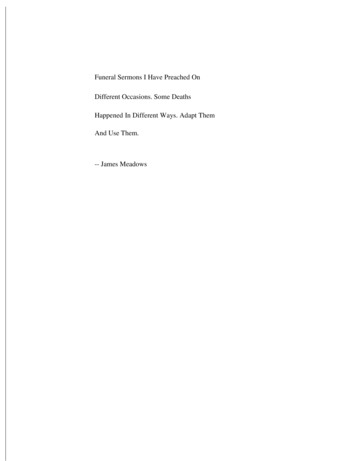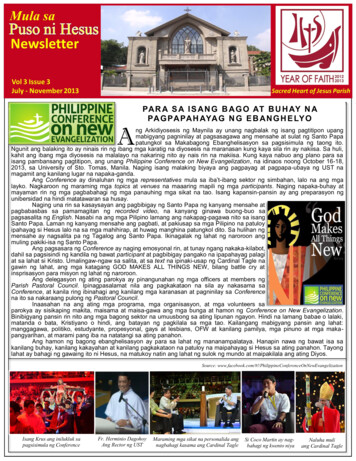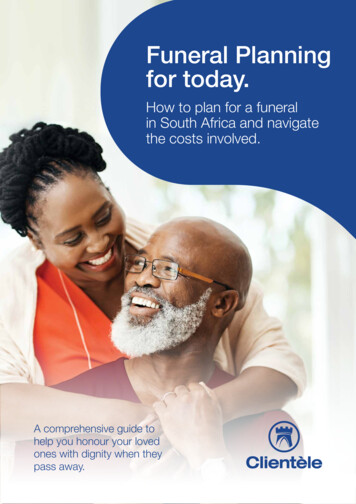
Transcription
Funeral Planningfor today.How to plan for a funeralin South Africa and navigatethe costs involved.A comprehensive guide tohelp you honour your lovedones with dignity when theypass away.1
Contents
4 Introduction6 Speaking about death7 Create a Life File8 Important steps if someoneclose to you passes away10 How to plan a funeral- Choosing a funeral parlour- What does an undertaker do?- Traditional funerals- Pre-arranged funerals- Exhumations- Choosing a coffin or a casket- Cemeteries & graves- Choosing a tombstone- Transport- Food & catering- Venue and tent hire- Flowers- Clothing for the deceased- Funeral music and hymns- The eulogy- Cremations- Obituaries22 What to do when someoneclose to you passes away- Passing away at home- Passing away due to anaccident- Passing away in a hospital- Passing away in anothercountry (repatriation)26 How to get the DeathCertificate28 Funeral and life cover- What are the benefitsof being covered?- What does funeralinsurance cost?- Claiming on a policy32 Handling thedeceased’s estate- What is an ‘estate’?- What is an ‘executor’?- Costs typically payablewhen winding up an estate- The steps for winding upa deceased estate- What if there is no Will?36 Frozen bank accounts- Why do the banks freezethe deceased’s bankaccount?- How to access funds froma frozen bank account38 Funeral PlanningGuide Checklist40 Important contacts
IntroductionPlanning a funeral can be a difficult experiencewith unnecessary stress.Whether you are planningyour own funeral forthe future, or you haverecently lost a lovedone and need to plan afuneral for them, we have4put together this practicalguide to help you withgeneral funeral planning,what to expect and whatsome of the costs are.
This enables you tohave the breathingspace and peace ofmind you need toconcentrate on yourfamily and to grieveyour loss. Safeguardingyour world when youneed it most.Remember that it is goodto have trusted family andclose friends to help you.Communities, elders andreligious organisations,such as churches, canalso help.At the end of thedocument is a handychecklist to help youcheck the administrativeand funeral requirements.Disclaimer: All costs and timings portrayed in this guide are estimates,and are to be used for illustrative purposes only – applicable at time of publishing.5
Speakingabout deathIt isimportantto speakabout yourfuneralplanning andwishes withyour familyand thosecloseto you.61Let them know where your importantdocuments are2Where you have policies and accounts3Where you keep your ID4What you would like at your funeral5If you have a certified up-to-date Will andwhere it is kept6Make sure that the beneficiaries on yourpolicies are correct, as this could createcomplications for your family later on at claimstage.
Createa Life FileThis is a fileabout all theimportantaspects of yourlife. You mustkeep it safe,and only certaintrusted familymembers mustknow about it.A Life File will go along way to helpingyour family and lovedones deal with theadministration andpaperwork afteryour passing.A Life File containsall your personalinformation, such as: Bank accounts Life and funeral policies Investments Property details Your certified Will Y our nominated estateexecutors and lawyers A copy of your ID.It will also help dealwith family feuds,as your certified Willcan be executed bya legal executor.7
Important stepsif someoneclose to youpasses away.61238Contact the relevantauthorities. These couldbe emergency medicalprofessionals with anambulance service such asNetcare 911 or ER24, yourfamily doctor or the SAPS. ocate the deceased’sLID smartcard or greenbarcoded ID book.5Share the news withclosest family and friendsas soon as you feel youhave the strength to do so.4 ind out if theFdeceased hadany funeral or lifepolicies and contactthe insurers orbanks. If you or afamily member(s)are nominatedbeneficiaries on thedeceased’s policy,then you will needto contact the coverprovider as soonas you can. Theywill also need theDeath Certificate,so it is essential thatyou arrange thisdocument, as wellas the others, assoon as possible.Choose a reliableand reputable funeralparlour that will helpyou to arrangethe funeral.Contact yourreligious, cultural orcommunity leadersand elders.
789I f you have a funeralpolicy with a funeralparlour, you don’tnecessarily need toconduct the funeralwith that funeralparlour. They canpay out the insuredamount, and youcan have the funeralwith another funeralparlour. Please alsonote that the payouttimes differ from policyto policy, and that thefunds cannot be reliedupon to be paid outinstantly – it may takedays, weeks or evenmonths to pay out. ontact the deceased’sCemployers to see ifthey had any life coverthrough their employer.1110If you would like allthose who know thedeceased to attendthe funeral service,then you can place anadvertisement in thenewspaper, advisingof the date, time andvenue of the funeral.Find out if the deceasedhad a Will in place. Ifthere is no executornominated in the will,then you can seeklegal advice on the wayforward. If the Will waskept at the deceased’sbank, then the bank willusually help.Contact the deceased’sbank. The bank willfreeze the deceased’sbank account toprevent anyone fromfraudulently trying towithdraw funds fromthe bank account.9
How to plana funeralA funeral gives you theopportunity to honour,respect and rememberyour loved one who haspassed on. A funeral canalso be an important partof the healing process.Planning a funeral can be difficult as it canadd more emotional and financial strain onyou during your time of mourning.It will be up to you and your family tochoose a burial, cremation or ceremonialservice. Alternatively, the Will may containthe deceased’s specific wishes related tothe funeral.The type of funeral also depends onthe cultural and religious beliefs of thedeceased.10Funeral Planning for today.
The basics for a funeralservice:- Choosing a funeral parlour- Venue (church, chapel,cemetery or crematorium)- Date- Time- Transport- Catering- Flowers- Photos to be displayed- Who will be the minister/officiator- Sound and music- Eulogies and obituaries- Printed programmes- Hearse- AV presentations- Grave site- Tombstone- Unveiling11
Choosing afuneral parlourPlanning and organisinga funeral can be anoverwhelming experience– where do you even start?Choosing the right funeral parlourcan help you in this difficult time.Remember to get quotes fromdifferent funeral parlours.Questions to ask a funeral parlour:-- D o you have a private mortuaryfacility?This can help smooth the process ofproviding a dignified funeral for thedeceased.-- C an you help with all the legaldocuments? Your funeral parlour can help withobtaining all legal and administrativedocuments, from the Death Certificateto purchasing a grave site.What does anundertaker do?An undertaker (also called a funeraldirector) will help to take the stressand hassle out of the administrativeprocess, allowing you time to grieveyour loss and to concentrateon family.A good undertaker is there to providecare and guidance. You should feelcomfortable, safe and secure with yourundertaker, knowing that they can betrusted and relied upon to deliver a trulypersonable experience at this difficultand important time.They will also help with delegatingdifferent tasks and jobs to different familymembers and close friends. They can alsohelp provide counselling options if theyare needed.Insurance with a funeral parlour.It is important to go through the coverpolicy with the funeral parlour to see whatis covered and what isn’t when planningthe funeral.You don’t necessarily need to conduct thefuneral with the funeral parlour that issuedthe policy. They can pay out the insuredamount, and you can have the funeral witha different funeral parlour.Payout times differ from policy to policy,and it may take days, weeks or evenmonths to pay out.12Remember to have acertified copy of thedeceased’s ID smartcard orgreen barcoded ID book,as well as the Notificationof Death, so the undertakercan help you to arrange theDeath Certificate.
A good undertakershould help you to takecare of the following.1Helping you with taking care of thedeceased’s body.10 Cemetery or crematorium funeral2Storing, preparing and dressingthe deceased for viewing / burial /cremation.11 If cremation, the undertaker will help3Obtaining the Death Notice from themedical attendants / doctors.12 Local transporting of the deceased.4Helping you to register the death atHome Affairs and collect the DeathCertificate.5Supplying you with the originalDeath Certificate and the necessarycertified copies of these forms forestate and policy purposes.6Making sure if you would want anautopsy performed (if natural death),as it may help you with the details ofthe deceased when claiming fromthe funeral cover.7Organising death notices innewspapers.8Offer a selection of coffins andcaskets to choose from.9All funeral arrangements.arrangements.ensure all documents are completedby the relevant medical persons.13 Embalming of the deceased forrepatriation (if needed).14 Repatriation of deceased acrossborders (if needed).A good undertaker will also explainall the costs involved in a funeral.Make sure you find out exactly whatis included, so there aren’t any hiddencosts.Undertaker feesGenerally, undertaker fees start at aroundR4,000, but can vary depending on whatduties you would want them to perform.The funeral parlour will usuallycharge for:-- Storage of the body;-- Processing the death-related documents(including the Death Certificate);-- Preparation of the body;-- Use of a hearse.13
TraditionalfuneralsSteps for atraditional funeral:Please note thatthis is a generaloutline of atraditional funeral.There are manydifferent culturaland religiouspractices in SouthAfrica, but thisguide covers thebasics.With a traditional funeral,the actual burial can takeplace anytime from24 hours to two weeksafter the death took place,depending on religious orcultural traditions.141The deceased is usually taken in a coffin to thehome of the family the day before the funeral. Thefamily may hold a night vigil where the deceasedcan be viewed for the last time and religious,traditional or cultural rites can be performed.Some prefer to have a viewing on the morning ofthe funeral.2The next morning a tribute or memorial service isusually held at a church or chosen venue.3After the memorial service, the mourners goto the cemetery or place of interment where ashort service or traditional, religious or culturalobservances are performed.4After the interment, the mourners will usually go toa venue where food and refreshments are served.This can also be a time to celebrate the life of thedeceased.
Pre-arrangedfuneralsThese are funerals thatare arranged and paidfor in advance.You can choose everythingyou want for the funeralahead of time, including:-- coffin or casket-- clothing-- music-- flowers-- cemetery or cremationIt is helpful as it takes theburden off the shouldersof loved ones having toarrange and pay for thefuneral.ExhumationsAn exhumation is whena body is removed froma grave and relocated toa new grave.Sometimes the remainsmay be cremated, so theredoesn’t necessarily needto be a re-burial.Permissions from manygovernmental entities anddepartments will needto be obtained for anyexhumation.The Department of HomeAffairs, and an undertaker,can help.15
Choosing acoffin ora casketA coffin can beexpensive because itneeds to protect thedeceased’s body, aswell as the health ofthose that come intocontact with it beforeit is buried. It must alsobe strong enough to betransported.The difference betweena coffin and a casket:-- A coffin is usually wideat the shoulders andnarrow at the headand foot.-- A casket is rectangularin shape and is usuallymade of better qualitymaterial.It is always good to askyour undertaker to showyou all the different coffinand casket optionsavailable.A plain coffin can cost alittle over R800, while anaverage one could costaround R8,000.Top-of-the-range casketssell for between R30,000and R100,000.It is important to choosethe right size coffin.*Coffin and casket costs are estimatefigures for planning purposes only.16
Cemeteries& gravesHaving a peaceful restingplace for your loved one isa big consideration whenplanning a funeral.Purchasing a gravesite depends on themunicipality involvedand availability. A gravecould cost anywherebetween R1,500 andR50,000.Choosing a grave alsodepends on what typeof tombstone you wouldwant. Many cemeterieshave rules regardingthe size of a tombstonememorial.The different graveareas / sections are:-- L awn section: Reservedfor headstones only-- Monumental section:Reserved for fullmonumental memorials-- Memorial or niche walls:Reserved for inscribedplaquesAn undertaker can helpyou to choose and applyfor all the relevant permits.Choosinga tombstoneA tombstone can be alasting tribute to yourloved one. The prices oftombstones can vary fromR1,500 to R7,000 or more.What to consider whenchoosing a tombstone:The cemeteryDifferent cemeteries haverules for which tombstonescan be erected.The durability of thestoneGranite or marble are themost popular choices.TransportMost funeral parloursinclude the cost of ahearse as part of their fee.It’s best to confirm this,so there are no surpriseexpenses.Sometimes manypeople may need to betransported from thefuneral to the burial site.This could add up to alarge expense.If the deceased’s bodyneeds to be transportedacross a border, prepareto pay upwardsof R10,000.The shapeCustom shapes can beeasily designed.The design and visualsThese include the name,dates, and any specialwording, such as afavourite religious verse orpassage, song words orsayings.The letteringLettering can also play animportant role in the overalllook of the tombstone.Venue andtent hireVenue hire for a funeralcan range from R500 toR10,000 or more. Hiringa tent can cost anythingfrom R500 to R5,000.It all depends on thenumber of peopleattending and the type offuneral.17
Food& cateringThis is usually the areawhere a lot of financialand planning stress isexperienced by the onearranging the funeral.Especially if there aremany people attending thefuneral, such as 500 ormore.You will usually serve foodat the reception after thefuneral. This usually takesplace at the family’s homeor at a hired venue.You can either preparemeals yourself, with thehelp of friends, familymembers and thecommunity, or you couldhire a catering company tohelp.Many cultures in SouthAfrica require thesacrificing of livestock.A goat can costR1,000, and a cowcan cost R6,000.FlowersFlowers can add beautyand fragrance to a funeral.A special arrangementcan also be placed on topof the coffin and arounda photograph of thedeceased.Sometimes flowers arechosen for their specificcolour or because theywere the deceased’sfavourite.Prices range from R100to R10,000 or more,depending on yourrequirements.The eulogyThe eulogy is wherewe get to remember, torejoice and to celebratethe life of our loved one.A eulogy is a recounting ofall the special things thatthey have done in theirlives; who they loved, howthey devoted their lives totheir children, and whattheir passions were.It can involve sharingfavourite memories,stories, achievements andpersonality traits of thedeceased.18
Clothing forthe deceasedTaking the time tohonour your loved onethrough their clothingand appearance is awonderful way of payingyour respects.Try to think about whattheir favourite outfit was.You can also ask yourundertaker to clothe themin a brand new suit or abeautiful new dress.Add a personal touch,such as their favouritepiece of jewellery or aspecial object.Funeralmusic andhymnsIt is a wonderful tributeand an uplifting celebrationto honour your loved onewith their favourite music.If you have any musicallyinclined family or friends,you could always ask themto play a piece of music orsing a favourite song.19
CremationsYour undertaker will help you to take careof all the arrangements, such as:Cremationsare generallymore costeffective thantraditionalburialfunerals, butit all dependson whatyou decidefor theceremony.1Date2Time3Venue of the cremation4If you would want to scatter the remains in yourplace of choosing5Or bury the remains in a niche site or grave.A niche memorial is a small space where the urn isplaced, and a plaque is then placed over it.Most cemeteries and crematoriums offera cremation facility from around R7,000.A private cremation can cost aroundR5,000 while a chapel cremation startsat around R9,000.All cremations require that you complete a Schedule Aform. This will be sent to the crematorium for permissionto cremate. An attending doctor and a medical referee willthen sign off further schedules so the cremation cantake place.There is an extra cost (around R600) to get a cremationform from a doctor.There are strict laws for cremations in place. Itis comforting to know that you will receive onlythe ashes of your loved one, and not the ashes ofanyone else.20
Types e deceased isbrought in a coffin/casket to the funeralservice (church/venue). Afterwards,the deceased is takenin the coffin/casketto the crematorium.The funeral service(church/venue) is held,but the deceased andthe coffin/casket is notpresent.After the cremation takesplace the remains of thedeceased are given tothe family in an urn oran ash box.The cremation may havealready taken place, withthe deceased’s remainshanded to the familyin an urn or an ash box.ObituariesAn obituaryis a notice ofsomeone’s death.They are usually writtento bring across the facts,such as the time, placeand cause of the death,the surviving relativesand the burial and funeralarrangements.Points to consider whenwriting an obituary:-- The deceased’s name-- Date and place of birth-- Date, time and place ofdeath-- Key family survivors/nextof kin-- Any of the deceased’slife milestones and/orachievements-- The date, time andvenue of the funeral orceremony-- Any relevant contactdetails-- Any donation details-- A photo of the deceasedcan also be shared21
What to dowhenPassingawayat homesomeonecloseto you passes awayPassingaway athomeContact a medicalprofessionalThis is usually a firstresponse medicalprofessional or team likeNetcare 911, ER24 oryour family doctor. Theywill then determine if thedeath is natural (old age,illness, heart attack, etc.)or unnatural (accident, ordue to a crime, etc.).22Locate the deceased’sID smartcard or greenbarcoded ID book. Thisis important because youwill need it to arrange theDeath Certificate and dealwith life insurance, bankaccounts and funeralpolicies. If you can’tfind the ID document,then you will need toget an affidavit from theSAPS, highlighting yourrelationship with thedeceased.Look for anythingsuspiciousLook around for anythingsuspicious, like somethingthat could be linkedto a robbery or forcedentry or even a physicalaltercation. If there isnothing suspicious, thenthe medical professionalswill take the body to amortuary.If you think there maybe suspicious behaviourinvolved in the death, thenimmediately contact thelocal SAPS or call 10111.They will investigate thescene and then organisethe removal of the body tothe mortuary.What happens tothe body?All bodies are taken to themortuary where they aregently washed, cleanedand wrapped in a shroud.They are then kept in acold room until it is time forthe funeral ceremony.
Passingaway due toan accidentGet a Notificationof DeathThe attending medicalprofessional or doctor willneed to issue and sign acertificate to certify thecause of death (Notificationof Death). This could bedone at the home or ata mortuary. It is the firststep in obtaining thedeath certificate.Getting an autopsyIf the death was naturalthen there is no realneed for an autopsy tobe performed. However,sometimes an autopsy canhelp a family deal with thedeath. A private autopsycan cost around R5,000.If the death was deemedto be unnatural, thenthe body will need toundergo a compulsoryautopsy. The mortuarywill then issue a deathnotice after the autopsy.Contact family andfriendsNotify close family andfriends as soon as youcan, as they will helpyou to cope in thisoverwhelming andstressful time.Contact a reputablefuneral parlourAn undertaker froma funeral parlour canhelp to plan the funeraland even help you toget the necessary legaldocuments, such as theDeath Certificate.If a person died in a caraccident, you will mostprobably only be notifiedonce the body is in themortuary. In this instance,the body will need to beidentified by an immediatefamily member or closefriend.Identifying a body ata mortuary can be anoverwhelming experience.Some mortuaries let youidentify the body throughimages on a computerscreen. Other mortuariesplace the deceased’sbody on a stretcher,where it can be viewedthrough a window.Try to take a close friendor family member withyou for emotional support.Once the body is identified,then a body numberis issued. This numbercan then be given to thechosen funeral parlour orundertaker, who will thenarrange the funeral.23
Passingaway ina hospitalPassing awayin a hospitalmakes the initialprocess mucheasier to copewith because therelevant medicalprofessionals arethere to help withdetermining thecause of deathand issuing thedeath notice.State hospitals usuallyhave a mortuary facility,but most private hospitalsdo not. The hospital staffor an undertaker canhelp to arrange for thedeceased’s body to becollected.24
Passing away inanother countryRepatriation is whenthe deceased’s body istransported from onecountry to another.1. Planning for therepatriation-2.- Get quotesTry to get quotes fromdifferent funeral parlours(from both countries) soyou can compare prices.Your undertaker,Department of HomeAffairs, or the chosenfuneral service in thecountry where thedeceased passed away,would help with thefollowing:-- Costs can increasebecause it involvescompulsory embalmingof the body, as wellas permissionsand certificationsfrom medical andgovernmental parties.-- Arranging the return ofthe deceased’s body toSouth Africa;-- If the deceased istravelling by air, thenthe costs will increasesignificantly.-- Obtaining the relevantimport permits from theDepartment of Health;-- A rranging for the ashesto be returned to SouthAfrica if you wouldprefer the body to becremated;-- Arrange if you wouldlike a local burial in thespecific country wherethe deceased passedaway;-- Arranging a pauper’sburial, which is free ofany charges if a nextof kin cannot be tracedor they do not havethe financial means torepatriate the body.-- Try to find out if thedeceased had travelinsurance, and to thennotify the insurer to seewhat cover options areavailable.3. GovernmentassistanceThe Department of HomeAffairs may provide certainlogistical assistance andadvice in the event of thedeath of a South Africancitizen abroad.-- Please note thatthe South AfricanGovernment does notrender any financialassistance pertainingto the death of SouthAfrican citizens out ofthe country.25
The DeathCertificateThe Death Certificate is an important document.It will help you to sort out all the administrativedetails, such as life policies, bank accounts,estates and executors.Make a few certified copies of theDeath Certificate.Remember that when you send the Death Certificate orany other official documents to policy institutions, youneed to send all the pages of the document, and notjust the first page.How to get aDeath Certificate:12The attending doctor/medical professional, orthe SAPS in the case ofunnatural deaths, will issuea DHA 1663 (Departmentof Home Affairs Notificationof Death).Statistics South Africa1.79Training manualNotice of Death/Stillbirth (DHA–1663)You will be required to fillin the forms and providecopies of the deceased’s IDsmartcard or green barcodedID book, which will then besent to the Department ofHome Affairs for registrationand a Death Certificate(DHA-5) will be issued. 26Cause of death certification: A guide for completing the Notice of Death / Stillbirth (DHA-1663)
3The Department of HomeAffairs will issue a DeathCertificate on receipt ofthe Notification of Death(Form 1663) and the DeathReport (Form BI-1680). Yourundertaker and / or medicaldoctor can help you to obtainthese.4If the death occurred abroad,the applications for a DeathCertificate must be lodged atany office of the Departmentof Home Affairs or at anySouth African embassy,mission or consulate.5A Death Report (FormBI-1680) will be issued byan authorised person after adeath has been registered.Authorised people includemembers of the SAPS,authorised undertakers ortraditional leaders.67The Department of HomeAffairs will issue an abridgeddeath certificate free ofcharge on the same dayof registration of death.An unabridged deathcertificate can be obtained bycompleting Form BI-132.Note that no burial is allowedto take place in South Africawithout a certified burial order(Form BI-14).27
Funeral andlife coverWhat arethe benefitsof beingcovered?Funeral and life coverpolicies are designed topay out a lump sum uponthe death of the insured,at a time when their familywill need the financialassistance most.281A funeral policyaffords you peaceof mind, knowingthat your family willbe able to copewith your funeralexpenses.2Many reputablefuneral insuranceproviders offeraffordable packagesthat are tailored toeach individual’sneeds and financialcircumstances.3There are manydifferent types ofcover. You can coverjust yourself, or youcan cover you andyour spouse andfamily members.You can also providecover for aunts,uncles and evenfriends.
What does afuneral plan cost?Funeral insurance premiums can differsignificantly. The amount you pay is alldependent on the cover amount option youchoose, who you choose to cover, and whatthe benefits of the plans are.Contact a few reputable coverproviders and compare premiumswith the benefits.Always read the fine print beforetaking up a funeral or life cover policy.Find out the basics, like when thefull cover comes into effect, as somepolicies require a waiting periodbefore you are eligible for the fullbenefits.Remember that most policies will notpay out if the deceased died whilst inthe act of breaking the law.Additional benefits:Besides the benefit of paying out alump sum, a comprehensive funeralplan from a reputable provider usuallyincludes other benefits, such as:12Be sure to nominate the rightbeneficiaries.3For example, if you nominate yourchild who is under the age of 18, thenby law, the funeral cover provider willneed to pay the insured amount into atrust, which will then be administeredby an appointed executor.45Payment within 24 hours if alldocumentation is correctA specified amount of airtimewhen you claimA grocery benefitHelp put you in touch withreputable funeral providersHelp arrange much-neededgrief counselling.29
Claimingon a policyIn the event ofthe death of aloved one, youwill need to locateany funeral orlife policies thedeceased had inplace and contactthe relevant insurer.30They will then notify youof the documents youwill need to provide themwith so that the claimassessment can begin.
You can help speed up the claimsassessment process by having thefollowing documents ready:1A certified copy of the death certificate2Certified copies of deceased’s ID3Certified copies of beneficiary’s ID4Beneficiary bank detailsPlease note that the cover providermay require additional informationor documentation dependent on theindividual circumstances in order toassess the claim.31
Handling thedeceased’sestateWhat isan ‘estate’?It is the responsibility of the executor to:1Represent your estateAn estate is the total ofyour assets (everything youown) minus your liabilities(everything you owe).2Disburse your property to the mentioned beneficiariesAn estate can be made upof fixed assets (house) andmoveable property (car),investments, cash in thebank, an unpaid salary andshares in a business.3Calculate and pay the estate tax4Ensure that the correct documentation is filed withthe relevant authorities5Collect and arrange payments6Approve or disapprove creditors’ claims7Obtain information on potential beneficiariesWhat isan ‘executor’?An executor is the legalterm for the person/people/institution whoare nominated in a Will tocarry out the wishes ofthe deceased. It could bea trusted individual (friendor family member) or afinancial institution.32An estate is the total of your assets (everything you own)minus your liabilities (everything you owe).An estate can be made up of fixed assets (house) andmoveable property (car), investments, cash in the bank,an unpaid salary and shares in a business.
If no executorwas nominated,the court will thenappoint an executorto take care ofthe estate.On average,an uncomplicatedestate takesmonths to wind up.33
RCosts typicallypayable whenwinding upan estate:1Advertising costs72Conveyance fees83Rates and taxes4Master’s fees5Taxes6910Medical costsMaintenance andaccrual claimsFuneral costsExecutor’s feesDebts (e.g. bond,overdraft, creditcards, store cards)These fees are paid outof your estate. If there aren’tenough funds in your estateto cover the costs, yourexecutor may have to sellyour assets or ask yourbeneficiaries to paythe costs.In some cases, the survivingspouse would need fundsfor living expenses. Theycan approach the executorto help make the fundsavailable. This is alwaysa difficult time, as it cansometimes take months towind up a deceased estate.Important:All funds belonging tothe deceased (as well asthe accounts of spouse inthe case of a marriage incommunity of property) willbe transferred to the newbank account.34In certain cases where thespouse would need fundsfor living expenses, theycan approach the executorto help make the fundsavailable. This is alwaysa difficult time, as it cansometimes take monthsto wind up a deceasedestate.
What if thereis no Will?If the deceased dieswithout drawing upa Will, or you cannotf
Planning a funeral can be a difficult experience with unnecessary stress. Whether you are planning your own funeral for the future, or you have recently lost a loved one and need to plan a funeral for them, we have put together this practical guide to help you with general funeral planning
